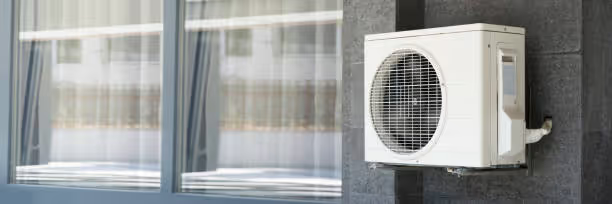Mini Split Service in North Hempstead, NY
Mini split systems are a popular choice in North Hempstead homes for efficient, zoned heating and cooling. Regular professional mini split service keeps these systems running quietly, uses less energy, and avoids mid-season breakdowns that are most inconvenient during Long Island’s humid summers and cold winter snaps. This page explains routine service offerings, common issues in North Hempstead, the diagnostic and tune-up process, repair options, recommended service intervals, and what to expect from maintenance plans or memberships.

Why seasonal mini split service matters in North Hempstead
North Hempstead’s coastal-influenced climate means high summer humidity, occasional salt spray, and variable winter temperatures. Those factors increase wear on mini splits by:
- Raising cooling demand and coil condensation, which encourages mold and reduced airflow.
- Accelerating corrosion on outdoor units near salt air or coastal breezes.
- Exposing heat pumps to more frequent defrost cycles and potential icing during cold snaps.
Regular service reduces energy use, prevents corrosion-related failures, and preserves indoor comfort across seasons.
Common mini split issues in North Hempstead homes
Understanding the typical problems helps you recognize when professional service is needed:
- Weak or uneven airflow from indoor heads
- Reduced cooling or heating capacity, especially during the hottest or coldest days
- Unit cycling on and off excessively (short cycling)
- Frozen indoor coils or icing on the outdoor unit
- Water leaks or clogged condensate drains
- Unusual noises from fan motors, compressor, or refrigerant flow
- Error codes on the indoor or outdoor unit
- Increased energy bills after a period of steady use
- Corrosion or visible corrosion risk on outdoor components
What a seasonal tune-up includes
A professional mini split tune-up focuses on performance, reliability, and safety. Typical service tasks include:
- Visual inspection of indoor and outdoor units for corrosion, loose hardware, and physical damage
- Filter cleaning or replacement guidance; demonstration of washable filter removal and reinstallation
- Coil cleaning (indoor evaporator and outdoor condenser) to restore heat transfer efficiency
- Condensate drain inspection and cleaning to prevent water backups and mold
- Refrigerant level check and performance testing (superheat/subcooling where applicable)
- Leak detection if refrigerant levels are low, and documentation of findings
- Electrical safety check: tighten connections, inspect contactors, capacitors, and board mounts
- Fan and blower motor inspection, lubrication if required, and vibration/noise checks
- Verification of airflow and temperature differential across the evaporator (delta-T)
- Check of line set insulation and condensation protection
- Test of defrost cycle, reversing valve function, and thermostat/remote control operation
- System startup and operational test with load conditions to confirm steady performanceAfter the visit you should receive a service report with findings, recommended repairs, and any measured performance data.
Diagnostics and performance testing explained simply
Technicians use a mix of simple measurements and targeted checks:
- Airflow and temperature drop: confirms adequate airflow and heat exchange
- Refrigerant pressure and temperature readings: confirm charge and performance
- Electrical readings: ensure safe voltages and proper compressor/fan operation
- Leak detection: chemical or electronic methods to find refrigerant loss sources
- Operational run tests: observe unit behavior in both heating and cooling modes
These diagnostics identify root causes rather than guessing, so repairs target the real problem—whether it is a dirty coil, a slow refrigerant leak, or an electrical fault.
Common repairs and solutions
Based on diagnostics, typical repairs include:
- Deep coil cleaning and sanitization to remove mold and biofilm
- Condensate line clearing or replacement; installation of secondary safety pans or float switches if needed
- Refrigerant leak repair followed by proper recharge per manufacturer specs (all refrigerant work requires certified technicians)
- Replacement of capacitors, fan motors, or indoor blower assemblies
- Repair or replacement of PCB/controls and communication wiring
- Replacing worn line set insulation and re-securing outdoor units
- Compressor replacement in older or severely damaged systems
- Updating firmware or replacing remotes/controls for communication faults
Repair choices are guided by system age, cost-effectiveness, and long-term reliability.
Recommended service intervals for mini splits
To maintain efficiency and longevity in North Hempstead:
- Filter cleaning: every 1 to 3 months for washable filters; more often during high pollen or dusty periods
- Professional tune-up: at least once per year for single-season systems; ideally twice per year (spring and fall) for heat pumps used year-round for both cooling and heating
- Refrigerant check and leak inspection: annually, or immediately if performance drops
- Membership or maintenance enrollment: ensures scheduled semiannual checks and documentation
Frequent tune-ups are especially important for coastal properties or homes with heavy year-round usage.
Maintenance plans and memberships — what to expect
Maintenance plans tailored for mini split owners typically offer:
- Scheduled seasonal tune-ups (spring and fall)
- Priority scheduling during high-demand periods
- Discounts on covered repairs or parts
- Service guarantees or workmanship warranties for maintenance tasks
- Documentation of service history, refrigerant records, and performance logs
- Reminders for upcoming visits and recommended filter or part replacement intervals
Enrolling in a plan usually means a predictable maintenance cadence, reduced emergency callouts, and better long-term equipment value.
Benefits of regular servicing
Routine mini split service delivers measurable advantages:
- Improved energy efficiency and lower operating costs
- Fewer emergency repairs and longer system lifespan
- Consistent indoor comfort with better humidity control
- Early detection of refrigerant leaks and corrosion before major failures
- Maintained manufacturer warranty eligibility in many cases
- Better indoor air quality through cleaner coils and filters
How recurring maintenance is handled
Recurring maintenance is organized around predictable seasonal needs: technicians schedule tune-ups before peak cooling and heating seasons, provide inspection reports after each visit, and maintain records of refrigerant levels and part replacements. Enrollment in a maintenance plan sets the schedule, secures priority visits, and standardizes service intervals so your mini split receives consistent care year after year.
Regular professional mini split service in North Hempstead protects comfort, controls energy costs, and preserves equipment reliability especially given the area’s humidity, coastal exposure, and seasonal temperature swings. Scheduling tune-ups at recommended intervals and choosing a maintenance plan tailored to mini split systems are the most effective ways to keep your zoning system performing at its best.
Customer Testimonials
Hear directly from homeowners who trust Bobby O’s HVAC Inc. for fast response times, honest service, and lasting comfort.











